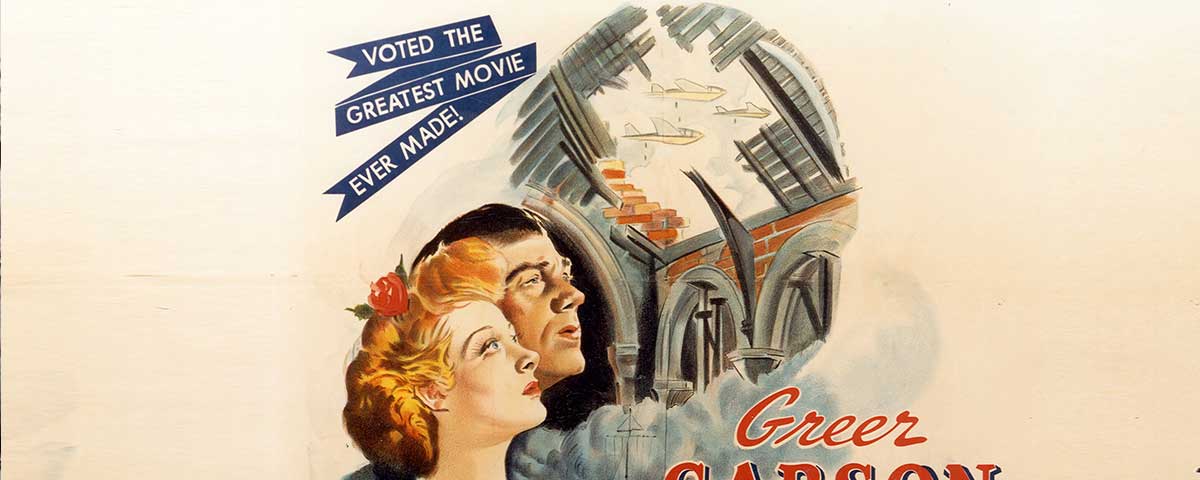MRS. MINIVER, AN American film, tells the story of life in 1939–1941 England, experienced, as the opening crawl tells us, by an “average English middle class family”—that just happens to be able to afford servants and a spacious residence whose lawn extends to a dock on the Thames River. Shot in Hollywood starting on November 11, 1941, and released in June 1942, the MGM film became that year’s highest-grossing picture and garnered six Academy Awards, including Best Picture, Best Director (William Wyler), Best Actress (Greer Garson in the title role), and Best Supporting Actress (Teresa Wright). Its appeal has endured; the American Film Institute ranks the film 40th on its list of “America’s most inspiring movies.”
Based on Jan Struther’s bestselling 1940 collection of anecdotal British newspaper columns, the movie has only tenuous ties to the namesake book, which barely reaches the war’s outbreak. Working with half a dozen writers, Wyler extended Struther’s timeline, weaving in Dunkirk and the Battle of Britain.
At the outset, Kay Miniver (Garson), husband Clem (Walter Pidgeon), and eldest son Vin (Richard Ney) are—as that crawl puts it—“happy, careless people…in that happy, easy-going England that was so soon to be fighting desperately for her way of life and for life itself.” Even when war breaks out the Minivers’ lives change little, though Vin does become an RAF fighter pilot. Reality intrudes only when Clem sails in his motorboat to join the makeshift flotilla that—offscreen—rescues the British Army from Dunkirk.
While Clem is busy across the Channel, a downed German pilot (Helmut Dantine) finds his way into the Miniver home. The screenwriters, responding to increasing American regard for England, reworked this sequence several times. In a draft predating Pearl Harbor, Clem is present; the German, wounded and frightened, yields to Kay’s entreaty to give himself up. In a post-December 7 version, the German has a weapon, Clem is absent, and Kay clearly in peril. The finished film presents the enemy airman as a fanatic. He holds Kay at gunpoint, demanding food he wolfs down like a wild animal before fainting from blood loss. Barely rattled, she confiscates his weapon and phones the constables.
When the pilot revives, too weak to be dangerous, Kay sympathetically tends him. He’ll soon be “wonderfully looked after in a hospital,” she says. “The war won’t last forever.”
Mrs. Miniver’s benevolence enrages the German flyer. “We will bomb your cities,” he storms. “Rotterdam we destroy in two hours. Thirty thousand in two hours. And we will do the same thing here!” This is unspeakably rude (and inaccurate; the Rotterdam bombings took 884 lives) and Mrs. Miniver slaps the brute. No sooner have the bobbies collected their prisoner than Clem chugs up to the family dock, his boat battered by that Dunkirk circuit. Nonetheless, Mr. Miniver behaves like a fellow completing a particularly grueling business trip. After greeting his family, he falls asleep. Waking 10 hours later, Clem asks if news of Dunkirk is in the papers. “Yes, dear,” Kay replies.
“Thank heavens,” her husband says. “I shan’t have to tell you about it.” And he doesn’t.
Nor does Mrs. M mention her adventure, until the cook reports that there is no ham. “You gave it all to that German pilot,” she says. Not a problem, Mrs. Miniver replies; the mister likes bacon, too. Naturally Clem asks what German pilot, and in a playful scene Kay treats the episode in an elaborately coy manner utterly typical of the film.
Come what may, the Minivers’ lives remain idyllic. Yes, there are air raids, but the family hunkers in its Anderson shelter and Clem talks about how much he likes Alice in Wonderland. Vin weds Carol Beldon (Teresa Wright), adding another Mrs. Miniver to the household—and a class dimension to the film. Carol’s grandmother is Lady Beldon (Dame May Whitty), a local aristocrat who frequently sniffs about the “middle classes” as the filmmakers try to make the Minivers more sympathetic to Americans. In the same vein, the film conveys that in wartime, England has done away with class distinctions. Even Lady Beldon unbends; at the annual floral competition—which she always wins—the grand dame permits a kindly stationmaster’s “Mrs. Miniver rose” to claim first prize.
Tragedy invades only near the conclusion. Just after the flower show an air raid claims several villagers, including the stationmaster and Vin’s bride, Carol. At a memorial service, the vicar (Henry Wilcoxon) delivers a powerful sermon. In the October 1941 script, he recited the 91st Psalm, which presents the Almighty as a refuge. After Pearl Harbor, Wyler and Wilcoxon wrote a stirring oration to follow the scriptural passage, completing the text hours before filming the scene. In it, the vicar laments the dead innocents, declaring that theirs is a war in which all must share in freedom’s struggle.
“This is the people’s war,” the vicar concludes. “It is our war. We are the fighters. Fight it, then! Fight it with all that is in us! And may God defend the right.” The camera holds on the resolute, dry-eyed Minivers as congregants sing “Onward, Christian Soldiers”; pans up to a ragged hole gaping in the church roof; and dollies skyward as a squadron of Spitfires passes, flying toward the foe.
The film works because strong performances—especially Garson’s—redeem preposterous characters, and the vicar’s conclusory oration has enduring power. However, Mrs. Miniver presents war mostly as a case of dreadful manners: a sanitized way to promote American solidarity with Britain without showing how horrible that “people’s war” would be.
Originally published in the July/August issue of World War II magazine. Subscribe here.






